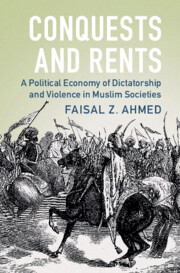Book contents
- Conquests and Rents
- Political Economy of Institutions and Decisions
- Conquests and Rents
- Copyright page
- Dedication
- Contents
- Figures
- Tables
- Acknowledgments
- Part I A Political Economy Approach
- 1 Political Violence
- 2 Analytical Framework
- Part II The Institutional Legacy of Muslim Conquest
- Part III The Impact of Contemporary Rents on Dictatorship and Violence
- Part IV Conclusion
- References
- Index
2 - Analytical Framework
from Part I - A Political Economy Approach
Published online by Cambridge University Press: 01 June 2023
- Conquests and Rents
- Political Economy of Institutions and Decisions
- Conquests and Rents
- Copyright page
- Dedication
- Contents
- Figures
- Tables
- Acknowledgments
- Part I A Political Economy Approach
- 1 Political Violence
- 2 Analytical Framework
- Part II The Institutional Legacy of Muslim Conquest
- Part III The Impact of Contemporary Rents on Dictatorship and Violence
- Part IV Conclusion
- References
- Index
Summary
Among political economists, the prevalence dictatorship and civil conflict captures the central features of societies afflicted with political violence. Accordingly, this chapter adopts this terminology and develop an analytical framework to better understand why many Muslim societies are inflicted with varying and heightened levels of political violence. The chapter identifies patterns in dictatorship and civil war in Muslim societies, relative to non-Muslim societies; and how they vary across oil and non-oil producing countries. These empirical patterns motivate a discussion of how variation in preexisting institutional structures and sources of nontax government revenue (rents) may explain these patterns in political violence. This discussion identifies tensions in existing theoretical accounts, leading the author to develop a formal model. The model shows that increases in rents can entrench dictatorship, while a decline in rents may facilitate peaceful transitions to democracy or lead to the outbreak of civil war. Societies whose preexisting institutional structures encourage “sharing” government resources with the opposition are more likely to transition to democracy. The model’s hypotheses form the basis of book’s subsequent empirical analysis.
- Type
- Chapter
- Information
- Conquests and RentsA Political Economy of Dictatorship and Violence in Muslim Societies, pp. 24 - 60Publisher: Cambridge University PressPrint publication year: 2023

